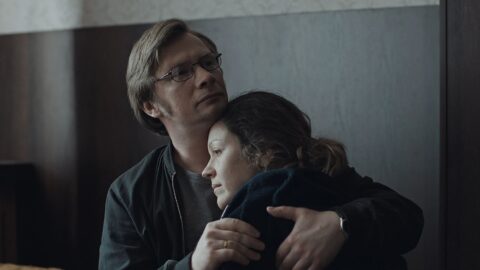Lena (Aliaksandra Vaitsekhovich) reports from the window. Staying above in an apartment gives OMON (Belarusian riot police) less chance of spotting her. The people are in the informally known “Square of Changes” in Minsk, the place where Raman Banderenka was beaten up in 2020 by masked thugs for attempting to stop them from cutting down red and white ribbons — symbolising the original white-red-white flag of the country before Soviet Occupation. He later died, spurring further protests.
In urgent handheld frames, split between TV footage of the protests and a tense apartment scene, Lena attempts to stay calm as she surveys the heavy-handed crackdown, all the while dreading the fated police knock on the apartment door.
She is a light fictionalisation of real-life journalist Katsiaryna Andreyeva, currently serving an eight-year sentence due to her work for Belsat TV. Polish Film Institute-backed debut Under The Grey Sky (Mara Tamkovich, 2024) methodically charts Lena’s incarceration, alongside her husband Ilya’s (Valentin Novopolskij, playing a version of Katsiaryna’s real-life husband Igor Ilyash) attempts to free her.
Under The Grey Sky is being marketed as the first feature film about the 2020 protests that followed Lukashenko’s rigged election. This isn’t true: Minsk (Boris Guts, 2022) got there first with a devastating, if misguided, one-take exploration of the randomness and brutality of political violence. But while Minsk felt designed to shock, provoking strong reactions from those saying it exploited the realities of Belarusian life as fodder for a thriller, Under The Grey Sky rings with an authenticity laced with quiet rage.
It’s the small, unremarked-upon details that often hit the hardest. When rushing to cover the protests, for example, Lena puts on multiple pairs of underwear in anticipation of a prison stay. And the mise en scène is particularly effective, with characters caught in tastefully and minimally decorated Minsk flats in medium-distance takes, showing how the horrors of everyday Belarusian life play out in domestic interiors.
These moments speak to the reality of resistance instead of its sensationalisation — as seen in the banal and stupid Civil War (Alex Garfield, 2024) — paying the ultimate testament to the humility and doggedness of these extraordinary reporters.
What feels so striking is the seeming impossibility of genuine change, and how that seeps into the affectless performances, the static camerawork, the lack of score and the muted greyscale colour palette. These journalists are not so much reporting on the current state of affairs to make a meaningful difference, but because it is simply the right thing to do. Seeing this heroism crushed under the brutal hand of totalitarianism is heartbreaking and infuriating.
It’s finished with real footage of Katsiaryna in action, including her heartbreaking statement in court: “We will win.” She is even smiling, astonishingly brave under such devastating circumstances. While her reportage is currently on hold, it’s heartening that we have talented filmmakers such as Tamkovich to carry on her struggle.
Redmond is the editor-in-chief of Journey Into Cinema.





